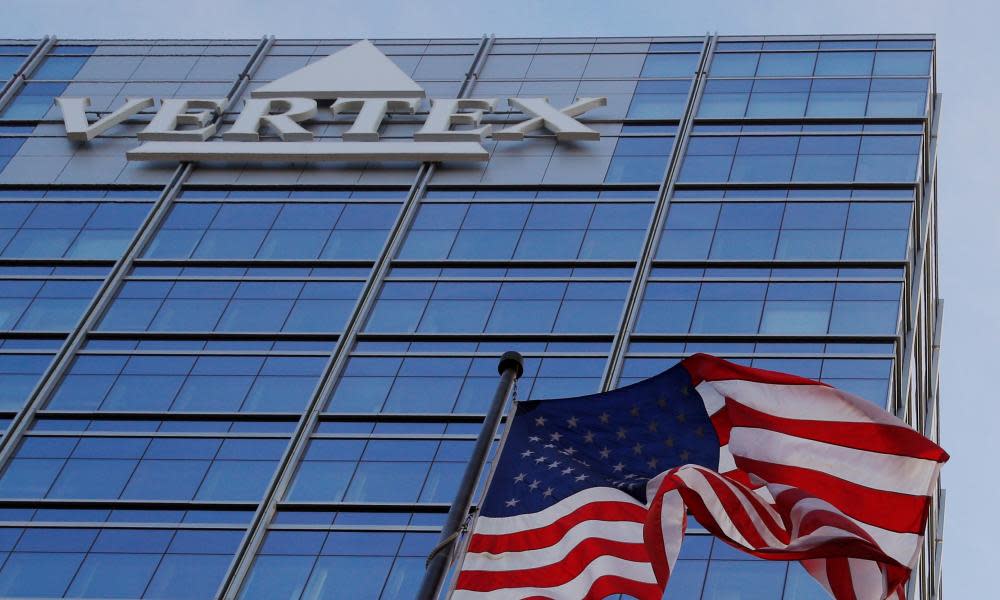Directors of cystic fibrosis drug firm in NHS standoff made £15m

Two UK directors of Vertex Pharmaceuticals, the company in a stand-off with the NHS over the high price of its breakthrough cystic fibrosis drug, made more than £15m from share options in 2017, the Guardian can reveal.
Vertex refuses to drop the price of Orkambi, a drug that treats the underlying causes of the life-shortening disease, to a level that the NHS says it can afford. Negotiations have been going on for two years and in stalemate for six months, while children and young adults with cystic fibrosis who could be helped suffer infections and irretrievably lose some of their lung function.
Vertex has put a price tag of £105,000 per patient per year on the drug which must be taken for life. Around 40% of the 10,400 people with cystic fibrosis in the UK could benefit from it. NHS England has offered to pay £500m over five years for access to Orkambi and other drugs in the Vertex pipeline that are expected to be more effective, renewable for a further five years. The company has rejected the offer. Campaigners have called on the government to intervene.
The two British vice presidents, Simon Lem and Simon Bedson (who has since retired), also received pay totalling £1.1m in 2017. Some of the campaigning families were surprised by the size of the remuneration package.
Christina Walker, mother of eight-year-old Luis, who has cystic fibrosis and is eligible for Orkambi but cannot have it on the NHS, said: “When we see the excesses of their executive remuneration, it really sticks in the throat that they say they can’t compromise on price, because their excuse is always that it will jeopardise future [research and development]. And they always say to us we are working towards a cure which makes people think you can’t drop the price – they won’t have enough money to find a cure.
“But when we see their executive remuneration and their huge share buy-backs, that then makes a nonsense of it. While we are watching our loved ones health decline and they are drawing multi-million dollar share packages, that’s very hollow.”
The high level of remuneration of Vertex’s chief executive, Jeff Leiden, has been criticised in the US, where the company is based. Leiden made $78.5m in 2017, and was the third highest remunerated healthcare CEO in the United States in the S&P 500. In July, he sold shares worth $22.4m.
In early March, MPs on the House of Commons health and social care committee will hold a public hearing into the stalemate over Orkambi. Letters submitted by Vertex ahead of the hearing make it clear that the company wants a change in the way the NHS decides how much to pay for drugs for rare diseases.
“As long as Nice [the National Institute for Health and Care Excellence] remains constrained by its current approach to the technology appraisal process, and, ultimately, by the budgetary limits set by the Department of Health and Social Care, it is unlikely that the parties will arrive at an outcome that grants access to our treatments for CF patients in England,” said Simon Lem, vice president and regional general manager northern Europe in a letter dated 16 January.
Lem has previously said that his overriding concern is to get Vertex’s drugs to patients. “Working in a therapy area like CF [cystic fibrosis] you are humbled every day by the courage of people with CF, their families and carers. As long as you always keep this at the forefront of your mind, then I believe this is the best possible motivation you can have to tackle the challenges that the day to day job has,” he said in an interview with the trade website Pharmafile in June.
“We are working hard in the hopes that all people with CF have the best chance for long and happy lives.”
Rebecca Hunt, the international vice-president of corporate affairs, for Vertex Pharmaceuticals, said the company had invested over $11.3 billion in research and development since 2000. “In the context of these huge investments, executive pay is not a significant factor in the cost of the medicines.
“An important element of all our employees’ compensation packages, including our executives, is that they are tied to the performance of the company.
“We’ve been able to successfully execute our strategy and deliver multiple innovative medicines to patients because we worked to attract and retain the management team necessary to drive an unprecedented level of progress and innovation.”

 Yahoo News
Yahoo News 
